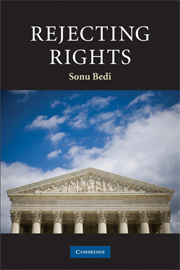Book contents
- Frontmatter
- Contents
- Acknowledgements
- Table of cases
- Introduction
- Part I Rights
- Part II Justification in theory
- Part III Justification in practice
- 6 Rejecting the constitutional rights to property and religion
- 7 Rejecting the constitutional right to privacy
- 8 Equal protection and judicial review
- Conclusion
- Bibliography
- Index
8 - Equal protection and judicial review
Published online by Cambridge University Press: 01 July 2009
- Frontmatter
- Contents
- Acknowledgements
- Table of cases
- Introduction
- Part I Rights
- Part II Justification in theory
- Part III Justification in practice
- 6 Rejecting the constitutional rights to property and religion
- 7 Rejecting the constitutional right to privacy
- 8 Equal protection and judicial review
- Conclusion
- Bibliography
- Index
Summary
The last two chapters argued that the Court has taken a turn to the central features of my theory of Justification rejecting the rights of property, religion, and intimacy that accompany the private sphere. Here I extend my argument to the Court's equal protection analysis. This chapter examines the best way to understand equality, and in particular, the Fourteenth Amendment's language of “equal protection.” Current constitutional jurisprudence interprets this language to mean that laws that invoke certain classes or classifications – such as race or sex – get heightened scrutiny. I argue that this focus on categories or groups is flawed. In line with my theory of Justification, we better ensure equality by simply adopting one standard of review asking if the legislation seeks only to minimize harm.
I concede that the Court has not moved in this direction. In fact, legal scholars have not even suggested an abandonment of the conventional equal protection approach for a single, unified level of rational review. I take up this task here. Under current case law, laws discriminating on the basis of race, alienage, and national origin get strict scrutiny: where the Court asks if the law is narrowly tailored to serving a compelling state purpose. Laws discriminating on the basis of sex get intermediate scrutiny: where the Court asks if the law is substantially related to serving an important governmental purpose. Rational review – that all other laws get – asks if the law is rationally related to serving a legitimate purpose.
- Type
- Chapter
- Information
- Rejecting Rights , pp. 165 - 188Publisher: Cambridge University PressPrint publication year: 2009

